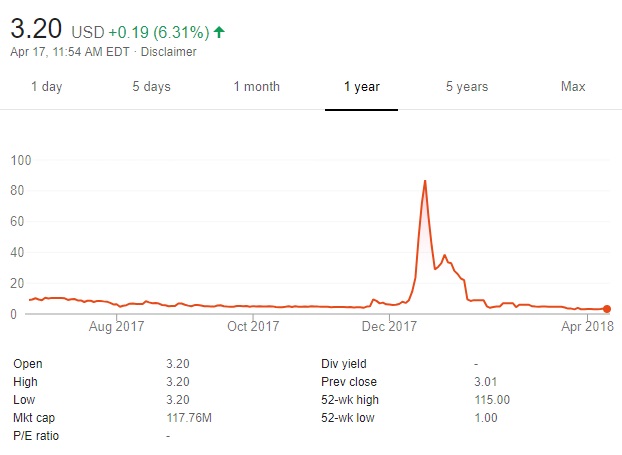We’ve all seen the “iced tea company that pivoted to blockchain” story. This was part of a wild trend that escalated toward the end of 2017. From iced tea companies to small-cap precious metal miners, seemingly everyone was looking to get a piece of the blockchain action. And most did. Many saw their share prices grow by 100 percent, 1000 percent, some even more than 10,000 percent.
Companies spent millions to advertise their new blockchain startup acquisition, or the thousands of mining rigs they planned to purchase, and traditional investors flooded into the space, lured by the promise of exposure to cryptocurrencies without the underlying volatility concerns.
But this was at the height of the bitcoin frenzy, while prices were soaring to all-time highs and fast movers were enjoying huge gains and others were still scrambling to make sense of the space.
Only a few months later, however, many of these companies are reeling. Shares plummeted, FOMO faded, and the SEC stepped in.
The benefits of the underlying technology these companies are embracing isn’t up for debate. Blockchain tech and cryptocurrencies are changing the world. So, what happened?
No Tech and No Assets
Remember that iced tea company? Long Island Iced Tea, now known as Long Blockchain, made its pivot in December. It announced that it would be diversifying from beverages to blockchain tech, after which, its shares soared by 300 percent overnight. The problem, however, was that the company’s filings did not reflect its new-found business plan. The company owned no blockchain assets and had little more than an idea and a dream to get into the space.

(Click to enlarge)
As its stock began to crash, Long Blockchain announced in January that it would be selling $4.2 million in shares in order to fund a 1,000-rig mining operation. Though, less than a week later, it abandoned the plan entirely.
In February, Long Blockchain was issued a delisting notice from NASDAQ for failing to maintain a minimum $35-million market cap, in addition to a statement from the exchange suggesting the company may have tried to mislead investors. On April 10th, Long Blockchain was officially booted from the exchange, moving it into the less desirable OTC market.
Related: What Does A Billionaire's Bucket List Look Like?
Another company that received a fair amount of press in its pivot to blockchain tech is UBI Blockchain. Run by the former management of a company whose primary product was an anti-bedwetting patch (seriously), it was noted that UBI had only 18 employees, $15,000 in cash, $6 million in debt, and zero revenue. Despite this, the company was able to capitalize on the blockchain trend, seeing its share prices hit $72 at one point.

(Click to enlarge)
Stanford Professor Charles Lee told Bloomberg “you certainly don’t want to own this stock.”
Obviously, this caught the attention of the SEC, which has since shut down the halted trading on the company’s stock.
"The Commission temporarily suspended trading in the securities of UBIA because of (i) questions regarding the accuracy of assertions, since at least September 2017, by UBIA in filings with the Commission regarding the company’s business operations; and (ii) concerns about recent, unusual and unexplained market activity in the company’s Class A common stock since at least November 2017," the SEC explained.
One of the highest-profile pivots is that of NASDAQ listed Riot Blockchain, formally Biotix, a med-tech company. Riot saw its shares soar from $8 to over $36 in last year’s bitcoin craze, and then quickly plummet to $6 after the hype subsided. The company is unique compared to the previously mentioned blockchain pivots in that it actually has assets. Despite its large portfolio of blockchain and crypto assets, however, Riot has received some particularly harsh criticism.

(Click to enlarge)
The company’s troubles began in before it even moved into the blockchain space. In the days leading up to its name change, share prices soared by 89 percent, with a February 22 class action lawsuit alleging the company made the switch “in order to generate enthusiasm and tie the company to the recent rise in the price of cryptocurrencies despite its lack of a significant blockchain business,” even suggesting that it was an “inside scheme that would allow Riot’s controlling shareholder Barry Honig and his associates to sell their Riot securities at artificially inflated prices.”
Related: Is The Global Economy Growing Or Slowing?
Riot’s legal troubles didn’t end there, however. Since the February lawsuit, a string of new charges has been raised against the company, most suggesting that Riot has misled investors and manipulated its stock price.
Conclusion
While these companies are just the tip of the iceberg in the stock market blockchain bandwagon, one can’t help but notice the irony. While institutional investors and high-profile stock analysts decry cryptocurrencies for being too risky, volatile, or for lacking inherent value, the companies praising ‘the tech behind bitcoin,’ have, generally speaking, crashed and burned.
This is not to say that all listed blockchain companies are bad, however. There are still companies that maintain strong portfolios of crypto assets, functioning blockchain use cases, and ever-expanding mining operations, though they are certainly in the minority.
Just like with cryptocurrencies, though, due diligence is key. As listed companies revive the same pump and dump strategies that have turned many people away from ICOs and cryptos, it is important to know what you are investing in, from the team to the assets to the revenue stream and profits.
By Michael Kern via Crypto Insider
More Top Reads From Safehaven.com:
















